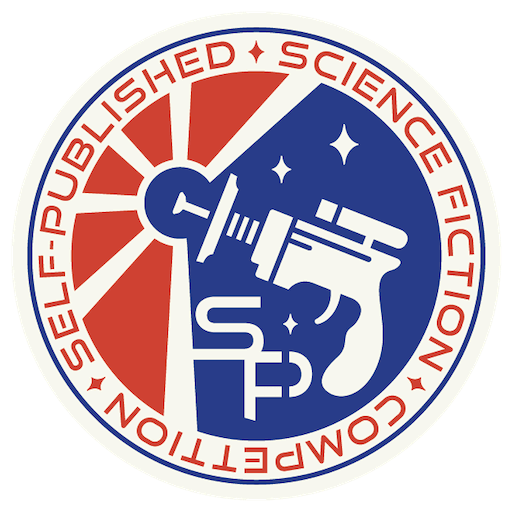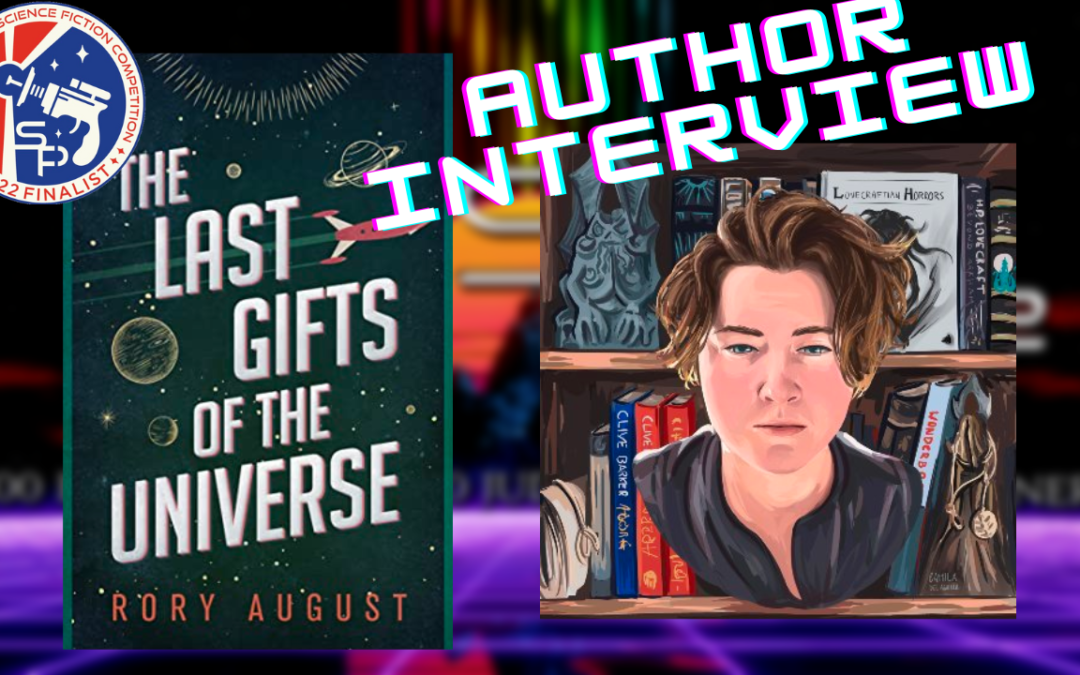MEET THE SPSFC2 FINALIST!
A special interview with Rory August!

Name and where are you from? (specific location is optional)
I’m Rory August, and I’m a little bit from everywhere across the US. I grew up in a military family and moved around a lot, and when I left the nest various universities and jobs moved me around a lot more. Currently I’m in New England and loving it.
How many other books have you self-published?
None!
Tell us a little bit about your discovery of science fiction (books, shows, movies) and why did it stick with you?
When I was six or seven, my (very young, very naive) parents took me to the theater to see Starship Troopers. I have a vague memory of fascination and terror, and a lasting fear of bugs. In part due to this, science fiction has always danced with horror for me. I became fascinated with H.P. Lovecraft’s work around thirteen, which gave way to Clive Barker, Stephen King, and an obsession with the zombie boom of the 2000s.
School brought me in contact with classic sci-fi works, most notably Le Guin’s, and also sci-fi cross-genres. Although classified primarily as YA, sci-fi-touched books like More Happy Than Not by Adam Silvera and Grasshopper Jungle by Andrew Smith were very formative for me, showing the genre’s quiet capacity to speak boldly about our present lives, not just our future ones.
Other than the fear of bugs, the genre stuck with me because it felt like it was saying something. This isn’t a knock on any other genre, but I think sci-fi is in a special, grounded place — part modern, part future, even part past — to guide the way we think about where we are now.
What/who made you want to become an author?
Like many of my fellow authors, it feels like I was born with a pen in hand. I’ve been writing and orating stories since I can remember. I like to think I’ve improved at least a little since I was five.

What elements do you feel makes your book unique’?
I think the most unique thing about Last Gifts is that I wrote it. Every author has a unique authorial voice, and I feel like mine comes out most naturally in the form of characters who hate, love, grieve, celebrate, and live — to their fullest, as best they can. Also, my book has a spacecat.
What are some themes or ideas you like to explore in your writing?
I enjoy exploring characters and relationships — loved ones at odds with each other and the like. I like creating imaginary people who emanate realness despite themselves, imaginary people who are flawed and sometimes weak, but also uniquely strong and dauntless with hope — just like every person I’ve ever known.
Fiction is a wonderful place to explore the human condition.
What may have inspired these?
We live our own stories every day. For me, that’s all stories are: the interactions, conflicts, and relationships between people. I could create the most imaginative, fully-realized world, but if that world goes unpopulated with genuine characters, there wouldn’t be much of a story. Life is like that, too.
What are some of your favorite tropes and how do you explore these in your writing?
I’m sure there are names for the tropes I’ve used in Last Gifts, but I’m afraid I don’t know them! My two favorite tropes to read — chosen one and enemies-to-lovers — aren’t present in the book, but I’m sure I’ll explore them in some future project down the line. Generally, if I know I’m using a well-worn trope I try to turn it on its head in some way, but the needs of the story always trump the need to be inventive or subversive.
What’s something about your book we might not get from the blurb?
Ah, well, many readers and reviewers have said that Last Gifts was not what they expected after reading the blurb. There are no lies in the blurb, but I do think it’s the frame of the true story, or the outermost layer of the onion. I hope reading and discovering the rest is an adventure for new readers!
What was your path or decision to self-publish?
The full answer to this question is probably pages long, and I don’t think anyone wants to read that! What I’ll say is that self-publishing just makes a lot of sense in this era. Everyone has the tools to publish their work on the internet. Many would claim this simplicity only leads to a deluge of subpar work, but I believe the democratization of book-publishing is, overall, a great thing that has led to the publication of many wonderful stories that may not have gotten the chance if only limited to traditional avenues. We’ve seen the success and power of individual creators in other mediums like youtube and video games, and I believe the increasing success of indie authors is a good indicator that self-publishing will remain a viable and popular path for sharing stories.
Had you queried for publishers or planned self-publish?
I did query a small number of agents with Last Gifts, as they were agents who I felt represented similar work. I knew the the book was far from meeting traditional metrics (it’s very short, very cross-genre) and supposed that if they weren’t interested in it for traditional publication, no one would be.
In the end I’m glad I self-published! My goal is always very simply to get my writing to readers, and I’m still amazed by how many people have given their time to reading Last Gifts. It really means a lot. Thanks, readers! I love you!
What’s something you’ve learned about the self-publishing process?
Change is a constant, always, but there have been many changes in the last year. Everything from Twitter’s change of leadership to the behemoth that is AI has presented a new and interesting challenge to overcome. When you’re the sole employee of your personal business, you have to keep up with this stuff! I guess I never expected to have my finger on the pulse of anything technological, but given that my publishing method of choice is the internet I suppose I might have expected that.
What is one thing that you love about the current state of Science Fiction and what is one thing that you wish you saw more of?
In the SPSFC alone, I can see that the definition of sci-fi is broadening, and I love seeing that. It kind of goes hand in hand with what I’d like to see more of, which is more readers of the genre! I think fantasy pulls a lot of people in because it’s flexible; there are subgenres and offshoots that cater to specific interests, but fantasy as a genre is very embracing of these nuances. ‘Fantasy’ is very strong and very well understood as an umbrella term, and I don’t think science fiction has that down quite the same. I still see reviews that offhandedly mention that sci-fi is highbrow, elitist, hard literature, even impenetrable. I’ve even seen authors debating whether a book is ‘truly’ science fiction! It can make the genre impenetrable indeed, and hard to communicate, market, and just generally, pin down.
My hope is that more authors give sci-fi elements a try, and that we keep embracing cross-genre and adjacent works under the umbrella. There is plenty of room under here, and we can absolutely share the space with the classically understood ‘harder’ elements of the genre.
What’s up next for you as a writer?
I’m always hesitant to even guess. Things change so fast these days! All I can say is that I’m always writing, and that when I have something meaningful to share, I’ll be very happy to share it.
Website: https://www.roryaugust.com/
Amazon: link
Twitter: https://twitter.com/rory_august
Instagram: https://www.instagram.com/mxroryaugust/

